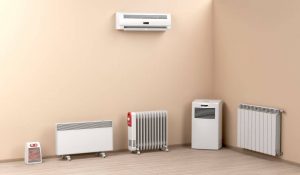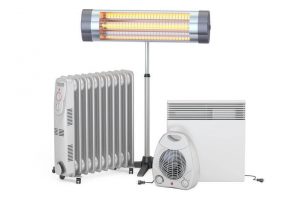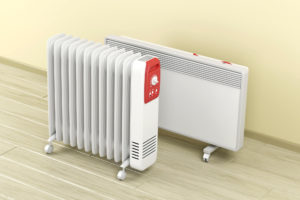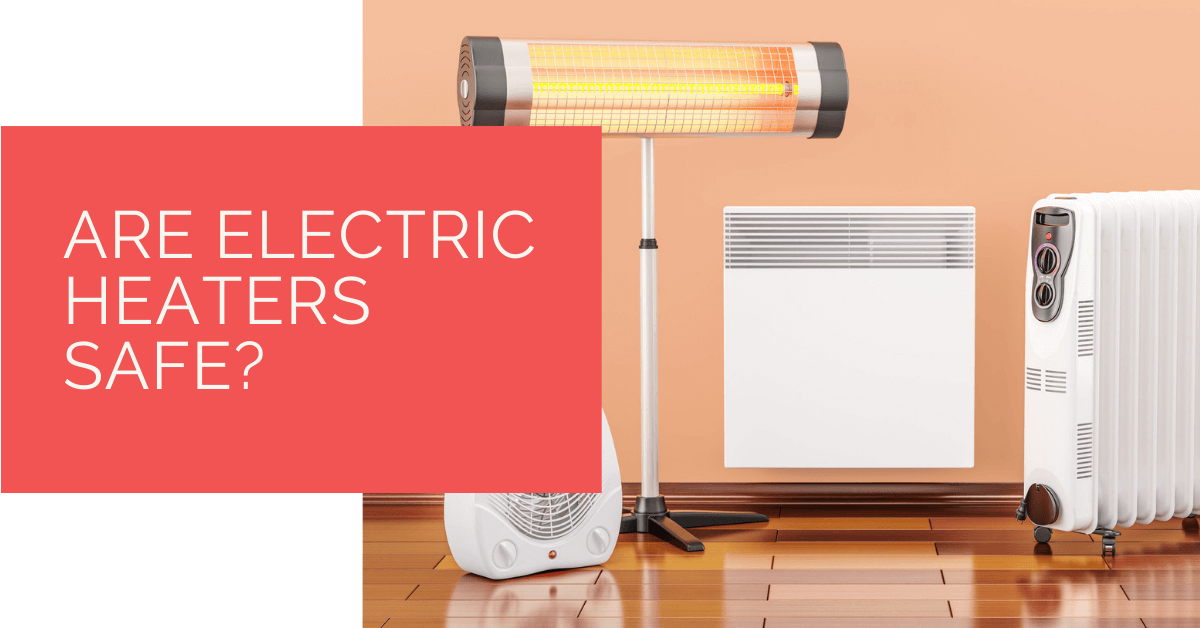The winter months have arrived in full force. The days are becoming shorter, and Christmas commercials will begin to air on television shortly. During the winter, you’ll have enough to keep you occupied, so make sure you’re comfy and your home warm when you arrange your activities.
An electric heater isn’t exactly the most thrilling Christmas present. But there’s no disputing that they’re getting a lot of attention right now. Are they something you should be thinking about, with promises of energy efficiency, lower heating bills, and more?
Although the financial savings are evident, are electric heaters safe to use in your home? And how does their safety certificate stack up against that of other, more traditional heating systems?
Contents
- 1 Key Takeaways
- 2 Safety Risks of Different Home Heating Appliances
- 3 Different Types of Portable Electric Space Heaters
- 4 Mistakes to Avoid While Using an Electric Heater
- 4.1 Do Not Plug in An Extension Cord.
- 4.2 Don’t: Use Non-Lab Tested and Approved Space Heaters
- 4.3 Don’t: Place Space Heaters on Top of Things.
- 4.4 Don’t: Let Your Kids Near a Space Heater.
- 4.5 Don’t Let Your Pets Near a Portable Heater.
- 4.6 Don’t Place Space Heaters Near Flammable Material.
- 4.7 Don’t Forget to Double-Check that Everything Is in Functioning Condition
- 5 FAQs
- 6 Heat Pump Source: Reliable Heating and Cooling Solutions
- 7 Conclusion
Key Takeaways
- Portable electric heaters, while effective for warming spaces, pose fire risks and should be used with caution, especially near flammable materials and when left unattended.
- Electric radiators are among the safest heating options for homes, as they have fewer safety concerns compared to other types of heaters like portable gas heaters or central heating systems.
- To use electric heaters safely, avoid plugging them into extension cords, ensure they are lab-tested and approved, keep them on the ground, away from children and pets, and maintain a safe distance from flammable objects.
Safety Risks of Different Home Heating Appliances
A portable heater is one of the most hazardous home heating appliances as it poses a high fire risk. Portable electric heaters have caused over 800 fires in the previous five years. While they might be a terrific way to warm up a space, they also come with a slew of dangers.
Portable heaters are frequently used near the human body and other materials. Blankets, duvets, and clothes all have the potential to catch fire.
Central heating has its own set of safety concerns. Carbon monoxide poisoning, fires, and explosions are not uncommon occurrences.
When electric radiators and boilers aren’t fitted correctly, this poses a significant danger. Those dangers become incredibly substantial if the system isn’t tested or maintained according to the proper method.
Older boilers and radiators that haven’t been maintained correctly may begin to leak, posing a new set of problems. We must treat gas leaks immediately to avoid explosions or fire risks.
Electric radiators are pretty safe, which should come as no surprise. They’re one of the safest forms of heating you can put in your house. It becomes even more apparent when comparing electric radiators to other heating appliances.

Different Types of Portable Electric Space Heaters
Halogen heaters
Instead of heating the air itself, halogen heaters heat a tiny region directly around them. This implies that they’re great for warming a small space but not so good for a large one.
Fan Heaters
Let’s take a quick look at what happens inside a fan heater. A metal coil is heated, and then the fan blows air over it, causing hot air to escape into the room. They’re simple to move around (but only while they’re off and chilly) and give quick heat, but they’re not as good at warming massive places as the halogen heater.
Oil-Filled Radiators
Oil-filled radiators are portable electric heaters that appear as permanent radiators in your house. Oil is heated within the heater and then pumped around the ‘fins’ of the radiator. The surface temperature rises as the ‘fins’ heat up, and the heat is subsequently discharged into the air.
Portable Gas Heaters
These heaters are portable and quickly heat the space in which they are placed. However, gas heaters do necessitate the replacement of gas cylinders, which may be inconvenient and dangerous.
Carbon monoxide poisoning is a problem when using gas heaters. Hence, The same room should have a carbon monoxide alarm installed.
Mistakes to Avoid While Using an Electric Heater
Electric heaters can be a serious fire hazard. You may avoid most electric space heaters’ risks if you take the proper precautions to maintain fire safety in your house. Fire and Rescue recommend avoiding the few faults listed below for additional information on using space heaters properly to heat your room this winter.
Do Not Plug in An Extension Cord.
Plugging heaters into extension cords may not be the safest option because they take a lot of energy to control temperature and frequently fluctuate in power when switching on and off. The extension cord might overheat due to the high energy levels, and there is no surge protector.
To minimise any potential electrical difficulties or fire hazards, it’s advisable to plug the power cable straight into the wall socket and not into an extension lead.

Don’t: Use Non-Lab Tested and Approved Space Heaters
A label on your space heater should state that it has been tested in a reputable laboratory. Read the manufacturer’s instructions and warning labels before using the heater. The answer to the question, “Are space heaters dangerous?” is no if you follow the directions carefully.
Don’t: Place Space Heaters on Top of Things.
Keep your space heater on the ground. This includes avoiding placing it on slick carpet or rugs and keeping it away from dressers, tables, and other furniture.
Avoid placing your space heater on a countertop unless the manufacturer recommends it. Even though the owner’s handbook says you may, you might want to avoid putting one up high if you have children.
While it may appear that placing your heater on top of something will keep it out of your children’s reach, it might fall or be dragged off, causing a fire, being unplugged, or causing burns or other injuries.
Don’t: Let Your Kids Near a Space Heater.
Keeping your children away from space heaters may appear to be a fundamental sense. Even if you are present to supervise, you should not allow children to touch them, play with the buttons, or move them.
Instead, it would be best if you taught your children about the hazards of touching a heater from an early age. If you can’t keep your children a safe distance away, it’s best not to use one.
Don’t Let Your Pets Near a Portable Heater.
Pets want warm, cozy environments, and they may be drawn to sit beneath, around, or even on top of your heater. This is extremely hazardous and may cause your pet to burn. Make sure your heater is set far enough away from your dogs’ favorite spots, and don’t leave them alone with it on.
Don’t Place Space Heaters Near Flammable Material.
According to safety guidelines, placing a space heater too close to flammable objects poses a significant fire hazard. To prevent the risk of ignition from a space heater, ensure that it is positioned a safe distance away from any materials that can catch fire, as recommended by experts.
Examples of combustible items include upholstered furniture, clothing, blankets, towels, mattresses, curtains, and bedding. To maintain a safe environment, ensure that nothing, including children and pets, is located within a specified safe distance from your space heater. Additionally, it is important to avoid using a space heater for purposes such as drying or warming up garments or shoes, as this practice can lead to a potential fire hazard.

Don’t Forget to Double-Check that Everything Is in Functioning Condition
During the summer, you’ll probably put your heater away, but make sure it’s in good working order when you bring it back out. Check any exposed wires that might be unsafe or cause the gadget to fail. Cables may have been chewed or damaged during storage. Make sure it’s dust-free if it’s a convector or fan heater.
FAQs
Are Portable Electric Heaters Safe to Leave on Overnight?
Leaving your portable heaters on overnight might cause a fire, and you should constantly be aware of your surroundings in case something goes wrong. If bedding and drapes in bedrooms are too close together, they might easily catch fire.
What Heaters Are Safe to Leave on Overnight?
Oil-filled heaters are a safer option since, once the oil is heated (which might take a long time), they will continue to emit heat even after you’ve turned them off. However, the same safety guideline applies: make sure there’s enough space around the heater to avoid carpets, clothing, and furniture.
Heat Pump Source: Reliable Heating and Cooling Solutions
At Heat Pump Source, we take pride in our unwavering commitment to serving the UK with top-tier HVAC solutions. From the efficiency of heat pumps and the cool relief of air conditioning to the warmth of boilers, radiators, and underfloor heating, our dedicated team is always at the forefront of innovation. We understand the unique needs of every household and business, and we strive to provide dependable health and cooling products and services that are tailored just for you. Ensuring your comfort and satisfaction is our utmost priority. Whether you have questions, need guidance, or require support, we’re always here to assist. Please don’t hesitate to contact us; we’re eager to be of service.
Conclusion
Portable electric heaters can be a great way to stay warm, but it’s important to use them safely. By following the tips in this article, you can avoid accidents and keep your family safe and comfortable all winter long.
About the Author
At Heat Pump Source, our articles are the product of a collaborative effort among a team of highly skilled HVAC experts. Our dedicated professionals, hailing from diverse backgrounds in heating, ventilation, air conditioning, and refrigeration, contribute their extensive knowledge and experience to every piece of content. This multidisciplinary approach ensures comprehensive coverage. Our commitment is to deliver authoritative, reliable, and tailored advice to meet the unique needs of every household and business across the UK.

